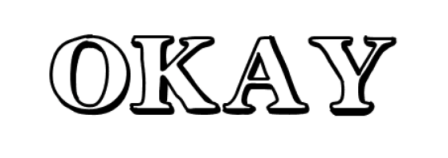
This is such a fun word, so first let me thank you for allowing me to share my 2 cents with you! First of all it is small, comprised of two sounds, a vowel and a consonant that give it the ability of meaning so many things and adapting to so many languages. It’s no wonder that there can be so many interpretations. When we say “OK” we could be talking about Oklahoma, but let’s not go there as that is just an abbreviation. Recently, a friend of mine told me a story that I thought to be true until I did a little research.
His version of the provenance of the word ‘OK’ came from World War I, when squadrons of planes were sent out on a mission. Communication in those days was not as instantaneous as it is today so the people back at the home base would have to wait for the return of the first few planes to find out what had happened, who survived and who didn’t. Generally the first pilot back delivered the summary first and the most important piece of news was to let the people know, how many of the planes and pilots did not survive the mission. When that first pilot would hold up his hand making a circle with the thumb and forefinger, and the other three fingers extended, this was the sign of ‘OK’ which meant ‘zero killed’. This was the sign that all were hoping for and the message spread across the base like wild fire. I don’t want to be misleading so again, I remind the reader that this story was obtained by word of mouth and upon doing a little research, I did not find confirmation of it.
My research did come up with many other explanations from scholars far better than I. One theory: it came from the Greek phrase “ola kala,” which means all good. And then there’s the Choctaw word “okeh,” which sounds like and means okay. President Woodrow Wilson reportedly thought it was the “correct” spelling of the word, and would OK documents with “okeh.”
And finally, the most famous OK origin story was attributed to Martin Van Buren, the eighth president of the United States of America, as he was from Kinderhook, New York. He was part of a club, a men’s club, called Old Kinderhook. And if you were cool, you were in the club, they’d say, ‘That guy’s OK.’ ‘Cause he was in the Old Kinderhooks.”
In 1839, an abbreviation craze was sweeping Boston. Charles Gordon Greene, editor of the Boston Morning Post, came up with an abbreviation — o.k. — which he indicated meant “oll korrect” if you didn’t know how to spell “all correct.”
In German it had been used as the initials of ohne Korrectur (without corrections). Or the initials of Otto Kaiser, who was an industrialist certifying his factory’s produce for shipping. Even the initials of Ober Kommando (the high command).
In French, the two distinct sounds of “O” and “K” are the same as “aux quais” (on the quays) said to be used during the American Revolutionary War of French Sailors making appointments with American girls. Or “Aux Cayes” – Les Cayes, Haiti is a port form which high-quality rum was exported.
As you see, the possibilities are numerous. Such a small expression with only two sounds can be claimed by so many cultures and languages. I suggest that the reader choose their favorite.
– Brian Barton